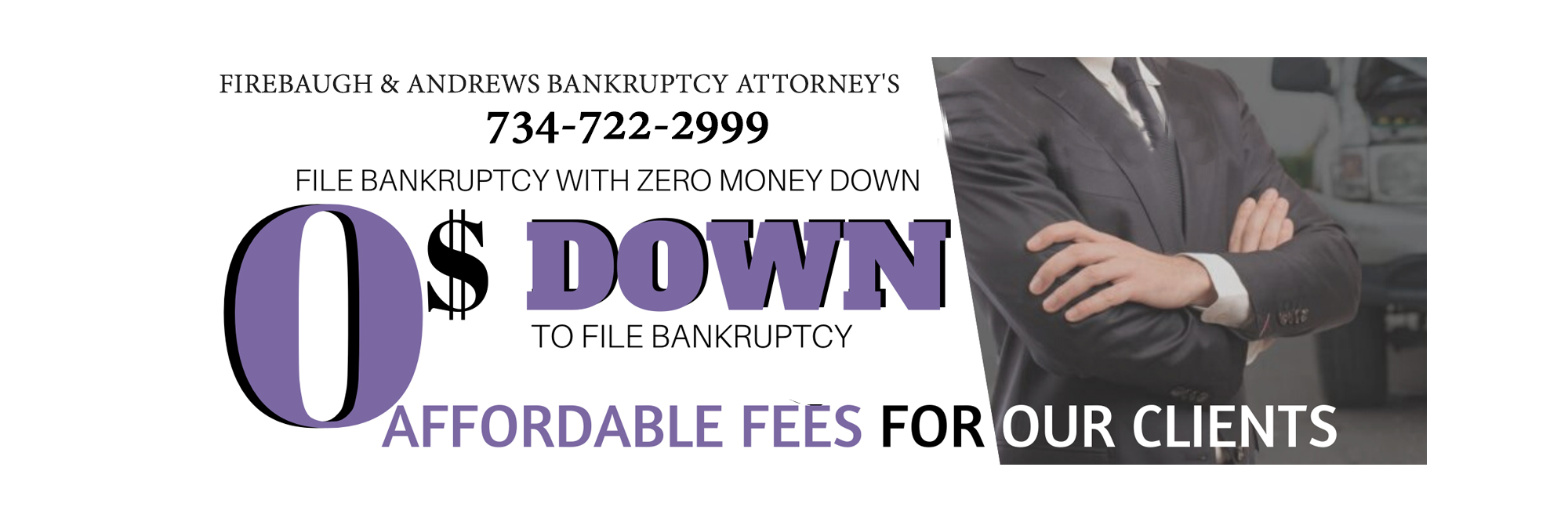
Who can file for bankruptcy?
It is certainly possible to file for Chapter 7 bankruptcy or Chapter 13 bankruptcy without an attorney. After all, there is no legal obligation for you to have one to file bankruptcy. But you should probably only file without an attorney if your filing a simple Chapter 7 case, as we’ll explain below. In this article, we’ll outline the steps you can take to file for bankruptcy without an attorney. We’ll also explain exactly how an attorney can help you throughout the bankruptcy process and whether it makes sense for you to file with or without one based on your situation.
Why would I file for bankruptcy without an attorney?
Filing for bankruptcy without a lawyer can help save you money. Lawyers generally charge between $500-3,750 for Chapter 7 and $2,500 and $6,000 to file Chapter 13. These numbers exclude the $335 filing fee for Chapter 7 or the $310 filing fee for Chapter 13 bankruptcy. So putting in some research and extra effort by filing the Chapter 7 yourself can go a long way in helping you get debt-free without taking on more debt in the process just to get some legal assistance. However, the U.S. Government strongly recommends you seek out an attorney’s advice in every Chapter 7 and 13 case, since bankruptcy can have long-term financial and legal ramifications.
When does it make sense to file for Bankruptcy without a lawyer?
You may not need a lawyer to successfully declare bankruptcy in a simple Chapter 7 bankruptcy case (Chapter bankruptcy 7 is the fastest route to completely wipe out most kinds of debt). The bankruptcy laws are relatively easy to apply to a simple Chapter 7 bankruptcy case, so you can get your debts discharged (debt wiped out) if you are willing to put in a bit of research and work, as we’ll outline below. We’d recommend only filing by yourself in Chapter 7 cases that meet the following conditions:
1. You pass the means test
You need to make under the average yearly income in your state to qualify for Chapter 7 or Chapter 13 bankruptcy. You need to be making less money to file for Chapter 7 than you do for Chapter 13. To file for Chapter 7 in Detroit, your household income has to be equal to or lower than $51,411 per year for a household of one, equal to or lower than $62,000 for a household of two, equal to or lower than $75,951 for household of three, equal to or below $92,720 for a household of four, and equal to or below $101,742 for a household of five. You can access the means test forms on the U.S. Government’s website.
2. You own few to no assets
The court defines property as an asset, since they can sell it and use the money to pay back your creditors (people you owe money). The court considers all of your property as part of your bankruptcy estate (objects they can sell to pay back your creditors) once you’ve filed. But don’t worry, you can still keep your house before, during, and after you file for Chapter 7 bankruptcy as long as you stay current on your mortgage payments. In Michigan, you can protect your home from creditors, so be sure to declare this when you fill out these files for bankruptcy. Chapter 7 bankruptcy enables you to continue paying your mortgage instead of using that money to pay off other debts, including debt on credit cards
3. You own few priority debts
Bankruptcy really helps give you a “fresh-start” by wiping out many kinds of debt. But it does not wipe out priority debt. Priority debt refers to debts that get paid first as soon as money is available to creditors. Priority debts do not get wiped out when you file for bankruptcy.
Below are the main forms of priority debt that bankruptcy does not wipe away:
- Fines, penalties, and money owed for violating the law
- Taxes
- Spousal support, child support or other support obligations
- Intoxicated driving debts
- Homeowners’ association dues after you file for bankruptcy
- Loans for retirement plans
- Money borrowed to pay off a bill that bankruptcy does not discharge (get rid of), such as taxes
- Debts that weren’t discharged (wiped away) from a previous bankruptcy
- Student loans (unless you can prove in court that keeping the loan will really hurt your financial situation)
4. Your creditors (people you owe money) do not claim fraud (that you tried to lie to or hurt them) against you
5. You’re willing to go through the filing process yourself
Filing for bankruptcy is a lot of work: you’ll need to figure out if you qualify, determine the legal and financial long-term results of filing on your finances, declare property you’d like to keep, take a debtor and creditor course, fill out files, submit them to court, and attend a meeting in court without professional guidance.
6. You are ready to learn bankruptcy law
In order to file for bankruptcy, you will need to become comfortable with the laws and procedures that govern Chapter 7 bankruptcy and the filing process. It’s important that you read through the laws when filing by yourself to ensure you file correctly.
Anyone can file there own bankruptcy
Yes, you can successfully file for bankruptcy without an attorney. However, it may still be worth it to hire a qualified attorney in a simple Chapter 7 bankruptcy filing, since you still need to spend a great deal of time researching bankruptcy laws, deciding how they apply to you, gather your financial information, and attend court. An attorney can easily and quickly guide you through this entire process, answering your questions when needed, and guaranteeing that your debts get successfully discharged (wiped out). An attorney will also make certain you will not need to declare bankruptcy again by providing you with specific guidance before, during, and after you file.
When You Definitely should NOT File On Your Own
Chapter 13 bankruptcy
You most likely need an attorney when filing Chapter 13, since it involves complex processes that are really difficult to navigate on your own. Declaring Chapter 13 involves creating a plan of how you will pay back the money you owe the debtors which the court will then approve. It’s very time-consuming to make this plan unless you have expensive financial software that many attorneys own to make creating this payment plan much faster and easier.
Chapter 13 cases filed without an attorney often get dismissed by the court. Chapter 13 cases are so difficult to file properly that the court may not even look at filings that were not prepared by a lawyer. Many attorneys avoid taking on Chapter 13 cases as the laws and procedures are so nuanced and challenging to apply. Be sure to check your attorney’s track record in Chapter 13 cases to determine whether they’ll help get your case discharged. Therefore, paying for a qualified attorney can help you get out of debt in these complex scenarios by actually ensuring your case gets discharged.
How will your lawyer help you file for Chapter 7 or Chapter 13 bankruptcy:
Before filing, your lawyer will:
- Help decide whether you should file for bankruptcy altogether. Many qualified attorneys will meet with you for an initial meeting which is often free. During this meeting, they will explain the bankruptcy process and laws to you in an easily understandable way. They’ll ask you specific questions about your financial situation, your debts, and other factors to determine whether and for what kind of bankruptcy you should file.
- Help decide if you should file for Chapter 7 or Chapter 13 bankruptcy
- Inform you whether you can discharge (get rid of) your debt. A good lawyer will discuss this information in the meeting before you hire them as well. This will help you decide whether filing for bankruptcy makes sense for you and your family.
- Answer any of your questions before you actually file–from where to take the debtor and creditor course, how filing for bankruptcy will affect your spouse or children, to what property you can and can’t keep after bankruptcy based on your specific situation. An attorney will also discuss the legal and tax consequences of filing in the initial meeting.
When you file, your lawyer will:
- Help you fill out and submit all the forms. There are many forms that you will need to fill out throughout the process. Your attorney will help you understand what you need to fill out and make the process as easy as possible to complete.
- Assist with almost every aspect of your bankruptcy case. This includes preparing your case, filling out and filing the forms, preparing for and attending the meeting with the creditors, as well as appealing the court’s ruling if necessary.
- Prepare you for what life will be like after you’ve successfully declared Chapter 7 or 13 bankruptcy.
After you file, your lawyer will:
- Check-in with you after the process to ensure you’re doing well and you are on the road to a debt-free future.
In summary
Yes, you can file and declare bankruptcy without a lawyer. However, it may only be worth it to file without a qualified attorney in a Chapter 7 bankruptcy case where it’s relatively easy to apply the bankruptcy laws on your own if you research the rules and learn what to expect. It’s very unlikely to successfully file for Chapter 13 or complex Chapter 7 cases without a lawyer, as navigating the laws can be very challenging. A qualified attorney should provide you with sound advice and guidance before, during, and after the filing process, affording you the ability to successfully get out of debt and receive your fresh start.





 get a free consultation
get a free consultation
Comments (0)